Tuesday, 05 October 2021
People living in a remote rural village in northern India now have access to a range of world-leading literature after a University of Nottingham historian founded a library in the place where he grew up.
Dr Arun Kumar is the university’s historian of modern India and Assistant Professor in Modern British Imperial, Colonial and Post-Colonial history. He was inspired to open the library in his family home in Kalyanpur, Uttar Pradesh after his experience of book poverty in his early years and his recent research on workers’ libraries in India.
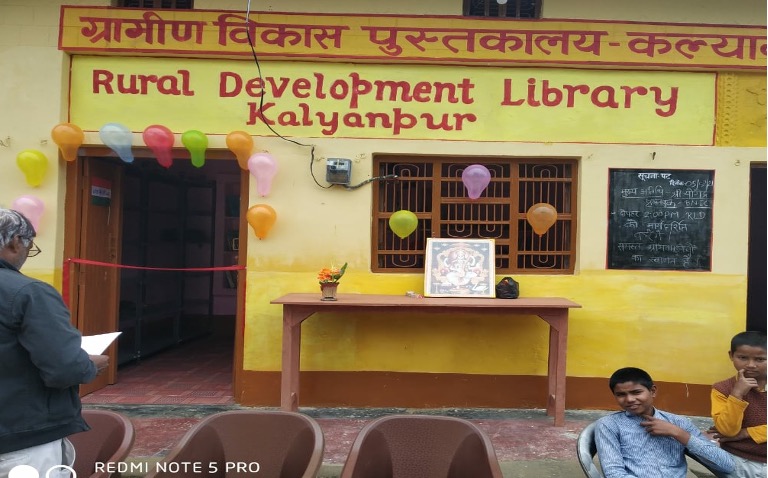 © Sunil Kumar
© Sunil Kumar
The Rural Development Library is one of the first privately-owned village libraries in rural North India. It serves a population of 4,000 farmers, small shopkeepers, homemakers, and service providers. The library offers books in Hindi and English in its one-room space and people can borrow them for one month with no fines for late return. Subjects include science, medicine, maths, history, and literature, as well as entrance exam papers, textbooks, and children’s books for a variety of age groups.
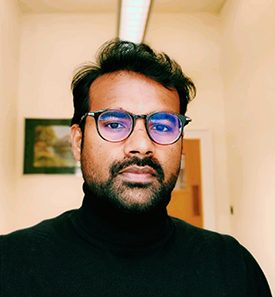 Dr Arun Kumar, Department of History, University of Nottingham
Dr Arun Kumar, Department of History, University of Nottingham
Dr Kumar said: “I grew up with only the textbooks my parents could afford. When I went to Delhi University, I felt there were big gaps in my knowledge so my mission is to make sure the children and young people living in Kalyanpur today have access to a much wider range of books and literature.
“Reading is a privilege that few can afford in rural North India. It’s a region marred by social inequality, a lack of up to date and relevant learning resources and wide-spread poverty. The villages don’t have libraries and reading materials are generally limited to out-of-date textbooks and religious literature.
“During my research into the educational aspirations of working-class poor people in India I came across a network of libraries in a few urban centres in the region. It prompted me to tour villages in 2019 and 2020 to give motivational lectures encouraging local communities to set up their own libraries. I then founded my own in my village of Kalyanpur. The response has been very good and gratifying and I hope it will make a real difference to people’s lives and educational aspirations. The most regular visitors to the library are also the poorest and socially marginalised members of the village community.”
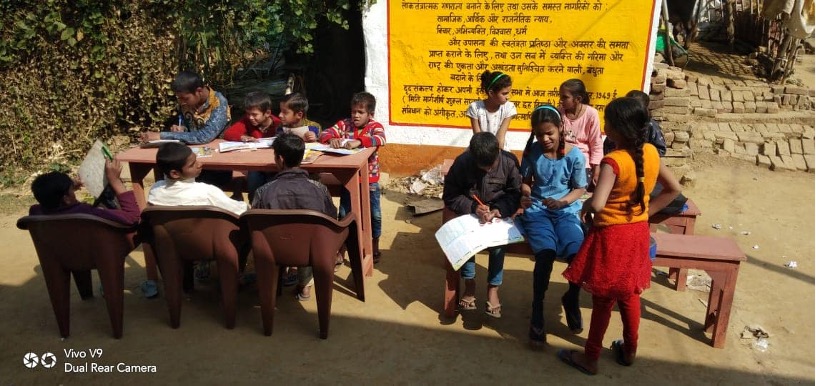 © Sunil Kumar
© Sunil Kumar
The Kalyanpur library is managed by Sunil Kumar. Sunil, 22 years old with a physical disability, left his small make-shift wooden grocery shop to join the library and prepare to become a schoolteacher. The library is stocked with donated books or books bought by Dr Kumar himself and the collection is growing. During the Covid-19 pandemic the reading room was closed but books were issued on loan for home reading. This year the library has held public talks and debates on education and reading culture in low-income villages in India. Hindustan, the local Hindi Newspaper, ran the headline: ‘Through the Library, the Professor has lit the torch of knowledge in rural areas.’
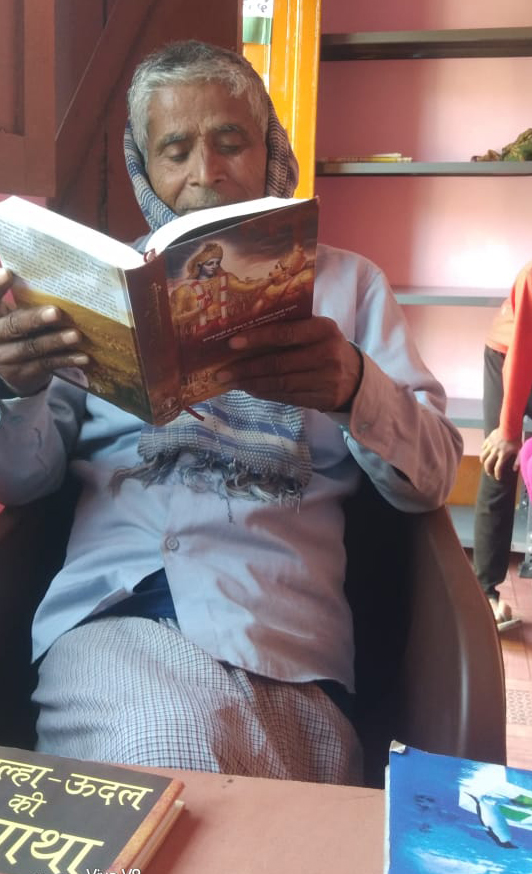 © Sunil Kumar
© Sunil Kumar
Jatin Lalit Singh, who runs the Bansa Community Library, has been critical in helping set up Dr Kumar’s library. He said: “It is really commendable of Dr Arun to start a library in his village and also in his own ancestral home. I have played a small part in helping him set up the library. We hope that these libraries in villages will inspire more people to use them and understand the importance of and need for free community libraries in villages. As a result more libraries will born and be the part of #RuralLibraryMovement. I firmly believe that one book, one pen, one student, one teacher, ONE LIBRARY will change the world.”
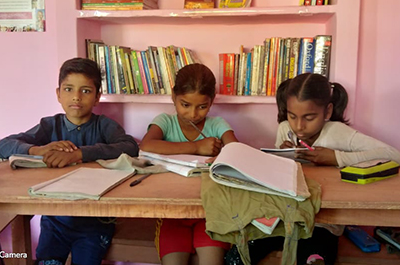 © Sunil Kumar
© Sunil Kumar
Sushant Patel, a 20-year-old student, from Kalyanpur, said: “I love visiting the library. It is peaceful and quite here. The best part is that I get books that I cannot afford to buy. I am competing for various civil services competitive exams and the library has come to act as a boon.”
Rajesh Kumar, a 55-year-old farmer, added: “The library has offered an alternative space of learning to my kids. Earlier kids were to roam and play in streets but now they have a place which they can avail if they want to study. The library has improved the overall environment of the village where a number of young children were getting exposed to alcohol addiction and gambling due to bad socialisation.”
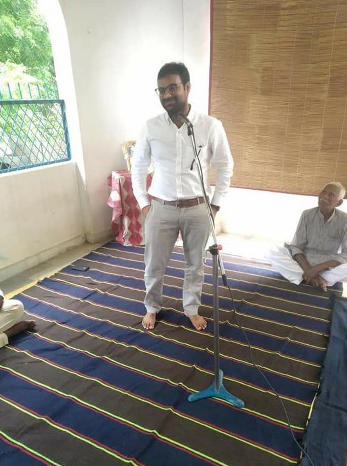 © Sunil Kumar
© Sunil Kumar
Dr Kumar plans to continue expanding the physical space of the library, number of books and learning activities. He believes that in this age of digital literacy and misleading information, libraries have a crucial role of building a positive learning culture at local and global levels. Libraries are not just spaces where you get your books, but they are also spaces of solitude learning, meet up, and new ideas. If you wish to donate books to the Rural Development library, follow this Amazon wish list,
https://www.amazon.in/hz/wishlist/genericItemsPage/2CEF73PD08ORE?type=wishlist&filter=unpurchased&sort=default&viewType=list
You can follow the library at Twitter @GraminLibrary and the work of Dr Kumar @arun_historian.
— Ends —
Story credits
For more information, please contact Dr Arun Kumar, Department of History, University of Nottingham via email arun.kumar2@nottingham.ac.uk or Emma Rayner, Media Relations Manager on 07738 291242 or emma.rayner@nottingham.ac.uk
Notes to editors:
About the University of Nottingham
Ranked 97 in the world and 17th in the UK by the QS World University Rankings, the University of Nottingham is a founding member of Russell Group of research-intensive universities. Studying at the University of Nottingham is a life-changing experience, and we pride ourselves on unlocking the potential of our students. We have a pioneering spirit, expressed in the vision of our founder Sir Jesse Boot, which has seen us lead the way in establishing campuses in China and Malaysia - part of a globally connected network of education, research and industrial engagement.
Nottingham was crowned Sports University of the Year by The Times and Sunday Times Good University Guide 2024 – the third time it has been given the honour since 2018 – and by the Daily Mail University Guide 2024.
The university is among the best universities in the UK for the strength of our research, positioned seventh for research power in the UK according to REF 2021. The birthplace of discoveries such as MRI and ibuprofen, our innovations transform lives and tackle global problems such as sustainable food supplies, ending modern slavery, developing greener transport, and reducing reliance on fossil fuels.
The university is a major employer and industry partner - locally and globally - and our graduates are the third most targeted by the UK's top employers, according to The Graduate Market in 2024 report by High Fliers Research.
We lead the Universities for Nottingham initiative, in partnership with Nottingham Trent University, a pioneering collaboration between the city’s two world-class institutions to improve levels of prosperity, opportunity, sustainability, health and wellbeing for residents in the city and region we are proud to call home.
More news…